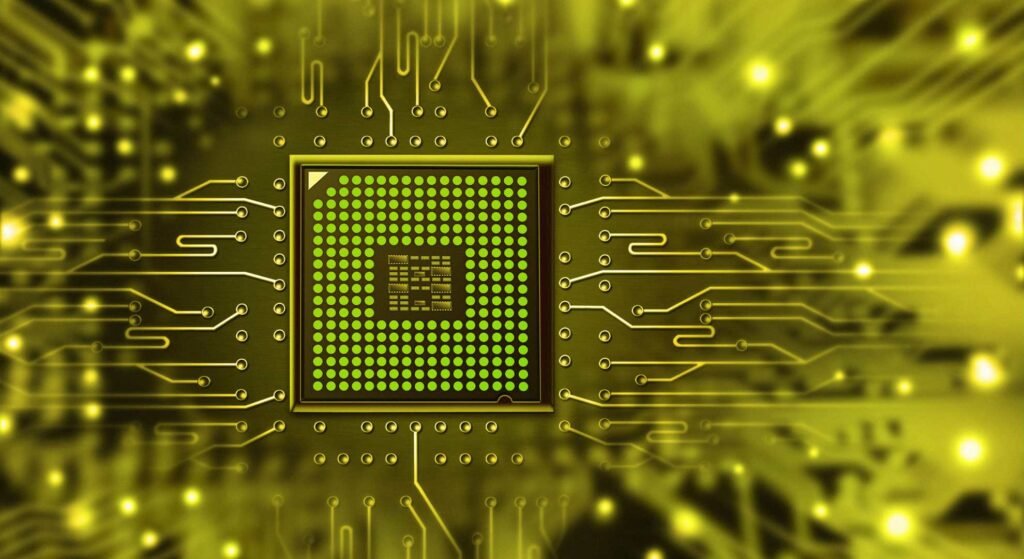To catch up with its rivals in artificial intelligence (AI), Apple is working on an AI chip to power AI software in data centers. The internally codenamed Project ACDC (Apple Chips in Data Center) aims to leverage Apple’s chip design expertise for its server infrastructure. While Apple has been tight-lipped about its AI plans in the past, CEO Tim Cook has expressed confidence in the company’s pursuit of generative AI and the substantial investments being made in this endeavor.
Falling Behind in AI
Apple, despite its success in consumer devices, has been lagging behind its tech peers in the AI domain. As competitors invest heavily in AI research and development, Apple has been evading questions about its plans for the technology. However, recent developments suggest that the company is gearing up to make a significant impact in the AI space.
The Custom Chip

Over several years, Project ACDC has been steadily advancing, drawing upon Apple’s renowned proficiency in chip design to fortify the performance of its server infrastructure. The culmination of this effort is a specialized chip meticulously crafted by Apple, with a keen focus on enhancing the execution of AI workloads within data centers. While specifics regarding the chip’s design and capabilities are closely guarded, it’s widely speculated that its primary objective lies in optimizing the execution of AI models through inference tasks. Inference, a pivotal component in real-time applications such as voice recognition, recommendation systems, and image processing, entails making predictions based on pre-trained models. This strategic emphasis on inference underscores Apple’s commitment to refining the efficiency and efficacy of AI-powered functionalities across diverse technological domains.
Benefits of an In-House Solution
Investing in its chip rather than relying on third-party solutions offers Apple a multitude of advantages, foremost among them being performance optimization. By leveraging its expertise in chip design, Apple can precisely tailor the chip to cater to the specific demands of AI workloads. This customization empowers Apple to achieve superior performance, enhanced energy efficiency, and overall system optimization, thereby elevating the capabilities of its server infrastructure.
Moreover, controlling the entire chip stack translates into heightened security and privacy measures. Apple’s strong commitment to safeguarding user data and its in-house chip further fortify these protections. By maintaining oversight over the entire development process, Apple can implement robust security protocols and encryption standards, ensuring that user data remains safeguarded against potential threats or breaches.
Strategic independence emerges as another compelling rationale behind Apple’s decision to develop its chip. By not relying on external suppliers for critical components, Apple mitigates the risk of being beholden to the whims of third-party vendors. This strategic autonomy affords Apple greater flexibility and control over its technological roadmap, enabling the company to adapt swiftly to evolving market dynamics and pursue innovative initiatives without being constrained by external dependencies.
Project ACDC: The Road Ahead
Despite several years of development, the official unveiling of Project ACDC by Apple remains shrouded in uncertainty. Throughout this period, Apple has maintained a close collaboration with Taiwan Semiconductor Manufacturing Co. (TSMC) to design and kickstart the production of these chips. However, the extent to which both entities have achieved a definitive result remains elusive. This collaborative endeavor is driven by the ambition to leverage TSMC’s advanced manufacturing capabilities to realize Apple’s chip design to its fullest potential. Nevertheless, the specifics regarding the conclusive outcome of this partnership and the fruition of Project ACDC continue to remain undisclosed elements within the tech landscape.
Apple’s Drive for In-House AI Chip Development
One primary reason behind Apple’s decision to develop its chip for AI software in data centers is to assert more control over the technology it employs. By relying on proprietary hardware, Apple can optimize performance, efficiency, and security, tailoring the chip specifically to meet its requirements. This approach is in line with Apple’s overall strategy of vertically integrating hardware and software components to create a seamless user experience across its product ecosystem.
Apple is working on an AI chip for data centers, and it reflects its commitment to staying competitive in the rapidly evolving tech landscape. As the company continues to invest in generative AI, we can expect exciting developments shortly. Keep an eye out for updates at Apple’s Worldwide Developers Conference!
Share your thoughts with us on whether Apple is working on an AI chip for data centers. Do you think this move is driven by Apple’s aim to catch up with its rivals in AI technology? We’re eager to hear your insights and opinions on these pertinent topics. Share your perspective in the comments below!
